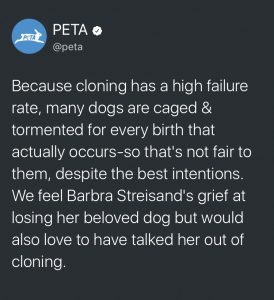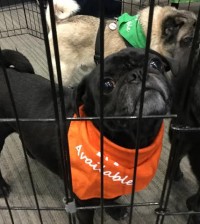- Do you subscribe to Dharma Dog Training’s Newsletter? You should.
- A Unique Campaign from The Humane Society of the United States
- Rabid bats in Omaha- Stay safe, prepared with these tips
- Springtime Activities in Omaha
- Mill Dog Monthly from Bailing Out Benji
- World Spay Day, Legislative Alert in Nebraska
- Attend the Nebraska Rescue Council’s monthly meeting this Saturday
- Five Hard-to-Ignore Reasons to Adopt!
- Paws in Pink to Benefit Breast Cancer Foundation
- VCA, Inc. Acquires MidWest Vet Specialists from Kansas State University
Cloning pets – an interesting trend, but don’t do it. Please.

Finally! We’ve been waiting to be able to reference Viktor Frankenstein on Pets in Omaha. All joking aside, the following is not from a Shelley novel. It’s real and it’s concerning.
We all know how much time, energy, and money it takes to keep a pet these days. Even if you’re not feeding a raw or natural diet, even if you’re not shelling out almost a thousands bucks a month to send your pup to doggie daycare, you are spending money on food, supplies, vet care, and the like. Our pets have become best buds to us and some even call them children. None of this is surprising.
One surprising note found in a CNBC article (which also details a woman who spent $50,000 to clone her dog– twice) is that millenials are buying houses to accommodate their animals at a faster rate than other millenials who buy to house their partners and/or children. Given that factoid, we shouldn’t be surprised at much, given the amount of commitment a home is. So we’re not shocked at the new trend of folks cloning their animals, right?
Wait… what? Yes, that one actually is a little surprising.
Without getting into the financial means of which one must have ($25,000 for a cat, $50,000 for a dog) to clone pets, and without getting into a discussion of generational changes in abilities to grieve, and without getting into any number of ethical discussions, we are here to simply report that the trend is here. We’re not here to pass judgement and we wouldn’t blame you if you cloned your dog because he was your soulmate. Well, maybe just a little. Actually, we’re totally opposed to it. Yes, this is nutso.
Reading about the process involved in getting a replicated Fido is sort of interesting, but we hope that reading is as far as you take cloning.
It’s not only a little nutty, it’s wrong. Here’s why:
We all know there’s a pet population problem. Here, there, and everywhere, animals are killed in shelters, left to roam the streets, left to wait in rescue. For every dog that gets adopted from a shelter today, there’s another waiting to take its place. It’s going to be that way for a while. The number of homeless or displaced animals in the U.S. is in the millions. So while all those problems exist, cloning a pet means you’ve replaced your cat with your cat, not a homeless one that a shelter or rescue has spent much effort saving, treating, socializing, training, loving, housing, and putting up for adoption.
In this way of thinking, what one does in cloning one’s animal is undermine the work that animal advocates are doing ceaselessly. One homeless animal who might have been adopted by someone is still homeless because that someone cloned Buddy, their dachshund who died last year, whose DNA was captured by a home biopsy kit and sent to someplace like Viagen, a cloning-capable company in Texas.

PETA states something similar in a recent tweet: “Because cloning has a high failure rate, many dogs are caged and tormented for every birth that actually occurs- so that’s not fair to them, despite the best intentions.” The tweet this is stated in (right) goes on to wish singer and actor Barbra Streisand had consulted them before cloning her pup; she recently told the world about her cloned dogs, bringing the issue to the forefront.
It is a person’s right to clone a pet. And though she is entitled, that person has to live with the cloning failures and homeless-animal-ignoring behavior and, in return, justifies the costs by gaining the sole, selfish benefit of Peanut the dog, part two.
That is, assuming, Peanut number two is just like Peanut number. one.
“Just because they’re genetically identical,” says the above-referenced CNBC article, “doesn’t mean they’ll look the same. Genes can be expressed in different ways, so the new animal may have different markings. And personalities can vary dramatically.”
The woman who cloned her dog in the aforementioned article is happy with the sound her $25,000-each dogs make. “They even sound the same way when they bark,” she says.
Look. That’s a ton of coin for a dog that barks the same-pitched bark as the dead one its DNA was taken from. We also know that if we all had $50,000 to throw at a clone dog, it might be hard to say no without hesitating for at least an instant. But even if one does have that money lying around, money shouldn’t be the issue. What’s important is to think about the implications of one dog on the planet replacing itself. There’s an old adage that goes something like, “If we can prevent something bad from happening, and we don’t stand to lose anything of comparable value, we should prevent the bad thing from happening.” That seems appropriate here. Lose an animal, adopt another, and all is balanced- at least as balanced as we can manipulate it to be.
One cloned dog equals one shelter dog that sits for another adopter. Two cloned dogs equal two sheltered dogs. On and on. There are other moral, ethical, philosophical things to be considered, but the pet population problem is the most real and impactful. Also, it seems to us, that because pets die, we should let them. And because coping with death is an inevitable part of life, we should learn to cope (and grow). We should also do whatever we can to be helpful to the animals who need help.
If this process cost something much less, would you do it? What would you consider outside of your natural desire to never have to say goodbye to your lost pet? Would you consider anything else? Should you have a concern for the larger picture? We’d love to hear any and all of your thoughts.
Log in if you’re a subscriber and leave a comment below and head over to our Facebook page and interact with us there.
Related Posts
Latest News
-
Join Us at Pick A Pooch 2025: A Fun-Filled Weekend for the Whole Family
A Fun-Filled Weekend for Pet Lovers and Families Alike Mark...
- Posted 1 year ago
- 0
-
Beardmore Presenting Sponsor At This Years Pick-A-Pooch event
🐾 We are thrilled to announce that Beardmore Subaru is...
- Posted 1 month ago
- 0
-
How Having A Pet Can Change Your Life
Having a pet can open your heart in ways that...
- Posted 3 months ago
- 0
-
How To Improve The Life Of Your Senior Pet
Do you have an elderly fur baby and want to...
- Posted 3 months ago
- 0
-
Springtime Activities To Enjoy With Your Furry Friends
Are you preparing for warmer weather and want some ideas...
- Posted 4 months ago
- 0
-
Pros And Cons Of Microchipping Your Pets
Have you considered whether your pets should be microchipped and...
- Posted 5 months ago
- 0
-
The Best New Fun Toys For Dogs And Cats
The Best New Fun Toys For Dogs And Cats Did...
- Posted 5 months ago
- 0
-
Heartfelt Ways To Show Your Pet You Love Them
Did you know there are more ways to show your...
- Posted 6 months ago
- 0























You must be logged in to post a comment Login